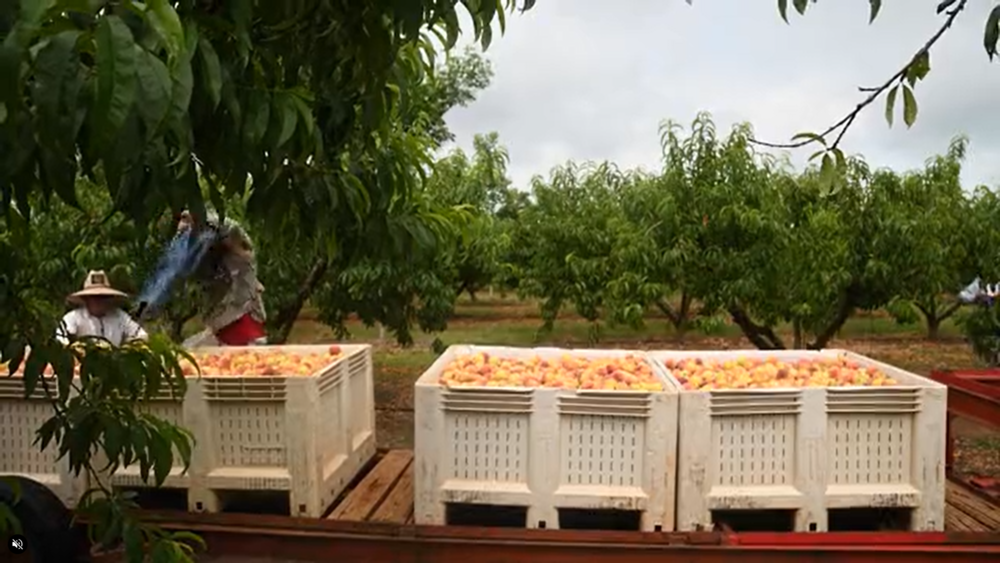
Caption
Lee and Robert Dickey with Dickey Farms discuss the 2023 peach crop. Lack of chill hours and a late freeze has caused a substantial loss in the crop.
Credit: Jason Vorhees, Ledger-Inquirer

Lee and Robert Dickey with Dickey Farms discuss the 2023 peach crop. Lack of chill hours and a late freeze has caused a substantial loss in the crop.
On a Monday morning in June, a few dozen peach pickers from the Mexican city of Guadalajara strode down rows of trees, in an orchard near Byron.
They walked one to a side, covering each row of the grove efficiently, with blue bags slung across their chests to collect the fruit, chatted in Spanish and unloaded their hauls into a large bin on a trailer hitched to a Chevy pickup at one end of the grove.
Supervising the pickers were two brothers, Elezar and Roberto Carrazco, who have worked at Dickey Farms, one of Georgia’s premier growers of the state’s most iconic crop, for three decades.
“I know when the peach is ready. I know when to pick and when not,” Elezar said. “It’s got to be at least three parts of the peach red, you know so it’s ready. But if you let it go, they’re gonna get soft.”
In a normal year, the farm would employ some 80 seasonal farmworkers from Guadalajara, which is the Carrazcos’ hometown. This year, there are around 30.
The reason for the reduced workforce was apparent in the sparseness of fruit visible on the boughs, which kept the pickers moving fast between the orchard rows. At each tree, the men paused to evaluate its offerings with a practiced eye — but as often as not, they seemed to move on to the next one having picked nothing or, at most, a few peaches.
This year’s peach crop is Georgia’s worst since the 1990s, peach growers say, with a projected loss of up to 95% of a normal year’s yield.
“It’s been a devastating year for a peach grower in the state of Georgia. Really, no one was spared, whether in South, Middle, or North Georgia,” said Will Bentley, president of the Macon-based Georgia Agribusiness Council.
Peach farmers have little financial recourse against an event like this, and Georgia’s elected leaders have pushed for relief in the form of both short-term assistance and long-term policy changes.
On Monday, Sen. Jon Ossoff spoke to Secretary of Agriculture Tom Vilsack in an effort to unlock federal disaster assistance for the state’s peach farmers. At a press conference at Lane Southern Orchards in Fort Valley, flanked by representatives of the Dickey, Lane, and Pearson peach farms, Ossoff announced that the USDA was issuing a natural disaster declaration, allowing peach farmers across rural Georgia to apply for loans to offset this year’s losses.
“When you have a situation that’s as dire as this one … it’s in our state’s interests and our nation’s interest to ensure that farmers stay on their feet,” Ossoff said.
Beyond the immediate relief newly available through these loans, some farmers and agribusiness advocates see an opportunity for more durable protections against such weather events in upcoming federal legislation.
The Farm Bill, a massive agricultural omnibus bill that is renewed every five years, is currently being negotiated in Congress for passage later this year.
Among the policies governed by this law is the Federal Crop Insurance Program, the primary instrument by which farmers can be insured against weather events.
Fruit and vegetable growers have long complained that the insurance program is primarily geared toward producers of row crops like corn and soybeans, which are harvested on a far greater scale than “specialty crops” like peaches.
Robert Dickey, who in addition to running Dickey Farms with his son Lee Dickey is a state representative and the chair of Georgia’s House Agriculture Committee, recently traveled to Washington D.C. with Bentley and the state agriculture commissioner Tyler Harper to lobby for improvements for peach farmers in the “inadequate” crop insurance program.
“We’re really trying to salvage our peach industry in the Southeast,” Dickey said. “It’s been here for 150 years, and we want it to continue.”
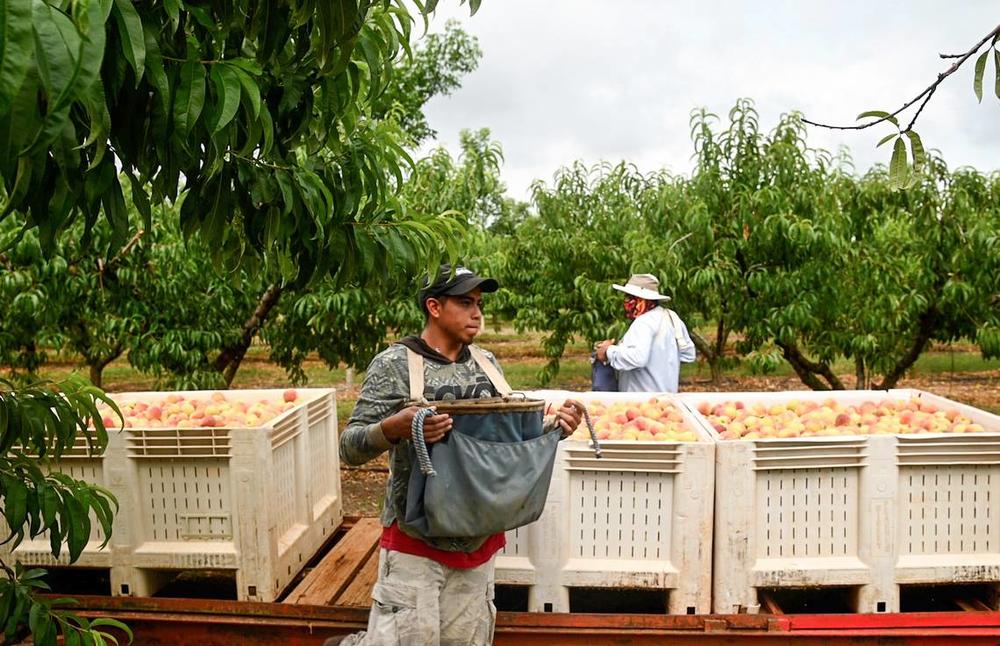
Dickey Farms workers pick peaches in an orchard in Byron on a Monday morning in June 2023. Dickey along with other Middle Georgia peach farmers sustained a substantail loss in the years crop due to lack of chill hours and a late freeze.
Georgia had another in a streak of increasingly warm winters, followed by punishing spring frosts in March.
Together, these conditions amounted to a deadly combination of weather events to which peaches are uniquely vulnerable.
Peaches require “a certain amount of cold weather over the winter, while they’re dormant, so that they build up their energy, and then when it gets warm, they blossom and produce a crop,” Pam Knox, an agricultural climatologist at the University of Georgia, told the Telegraph.
Each of the hundreds of peach varieties requires a different number of “chill hours” — the time spent dormant in temperatures below 45 degrees.
The varieties that require a lower amount of chill hours are more resilient to warm winters, and bloom earlier in the season. After “one of the warmest Februarys on record for Georgia,” Knox said, those varieties came out of dormancy early and prepared to bloom just in time for mercilessly freezing weather in March.
“That killed off most of either the blooms or the early peaches that had already bloomed and then fertilized, because they can’t handle the frost,” Knox said. “The water inside the cells expands as it becomes ice, and that destroys the properties of the blossoms and the properties of the root.”
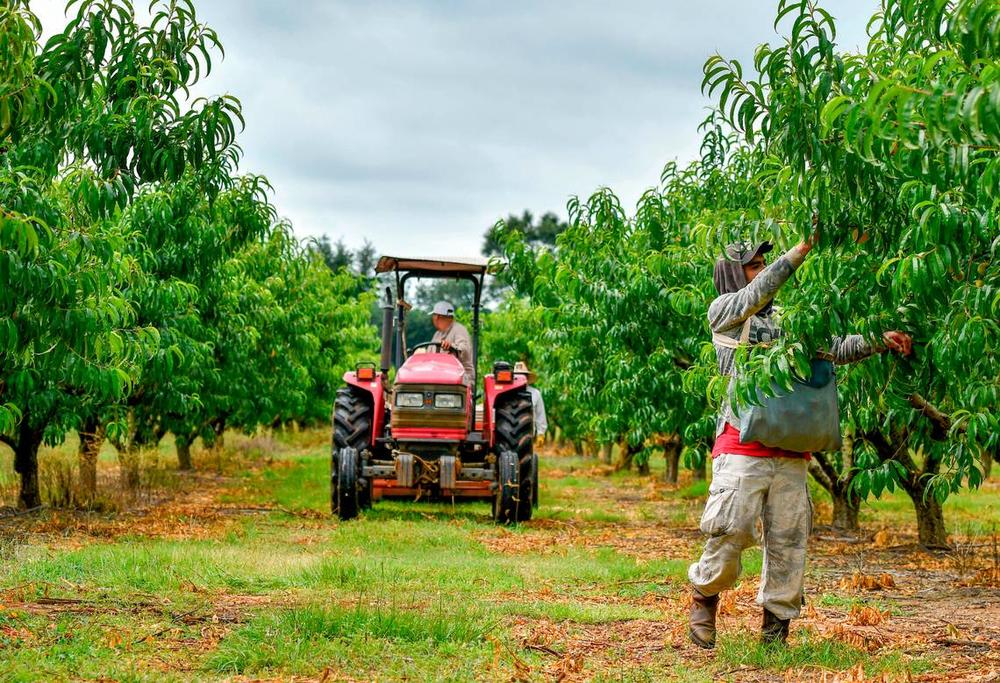
A Dickey Farms worker picks a peach in an ordcard in Byron on a Monday morning in June 2023. Dickey along with other Middle Georgia peach farmers sustained a substantail loss in the years crop due to lack of chill hours and a late freeze.
The dual weather events responsible for destroying the peach harvest — warming winters and spring frosts — are both part of wider climatological cycles.
“Climatologists never attribute a single event to climate change, because there’s always other things going on — we’ve always had colder and warmer winters; we’ve had earlier and later frosts — but it’s clear in Georgia that the trend in winter temperatures is towards warmer temperatures over time,” Knox said.
The outlook for spring frosts in Georgia as climate change raises global temperatures is less straightforward.
Knox said the frost is caused by seasonal incursions of cold air into the state, which are predicted to continue.
“Over time, the average date of the last frost in spring will get earlier, but we still get these incursions that come in, and those are driven more by weather patterns” than they are directly affected by global warming, Knox said.
While these notoriously complex weather patterns remain the subject of research, Knox said, some scientists predict “a more wavy pattern in the large-scale atmospheric waves that occur” due to melting Arctic sea ice, leading to both “more warm outbreaks and more cold outbreaks.”
Agriculture is Georgia’s largest industry, and the wide-ranging effects of rising global temperatures are felt directly and indirectly across the state’s crops, regions, and seasons.
But many of Georgia’s farmers and agribusiness advocates remain reluctant to acknowledge the responsibility of climate change for the dramatic changes to which they are nevertheless adapting their practices.
Asked about the role of climate change in this year’s peach crop failure, Robert Dickey reflected on the weather events his family farm had experienced in its long history in Musella.
“We’ve kept records in the peach industry for probably 125 or more, 150 years. We’ve gone through a lot of cycles with weather,” he said.
Turning to his son, the representative said, “I don’t know. We do seem to be in a time of more fluctuation, more — a little bit more extremes, wouldn’t you say, Lee, in the weather? But nothing extreme changed. I think it’s just some coincidence, possibly, what’s going on.”
When asked the same question, Bentley said, “We’re definitely paying attention to the weather cycles,” which he said play “a big, big role in decisions that we’re making” in investments in agricultural research and technological development.
“But I don’t know that you would necessarily, you know, get into the climate change debate,” he added. “More so, what are the weather patterns we are in, what are some of the impacts we’re seeing, and how do we mitigate that risk?”
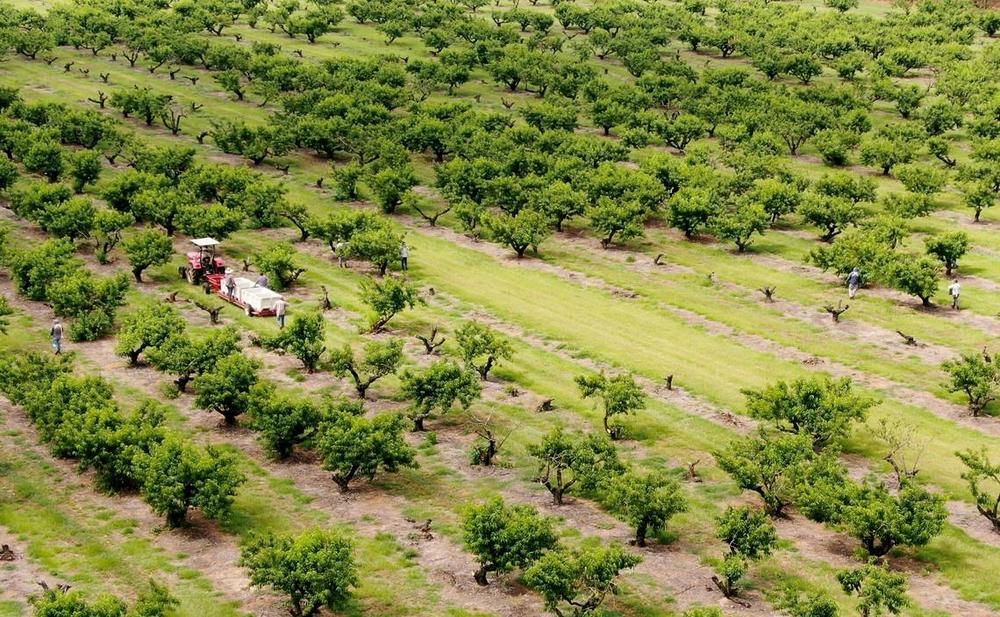
Dickey Farms workers pick peaches in an ordcard in Byron on a Monday morning in June 2023. Dickey along with other Middle Georgia peach farmers sustained a substantail loss in the years crop due to lack of chill hours and a late freeze.
Such pragmatic considerations are widespread among Georgia’s farmers, Knox said.
“Calling it climate change is more of a political thing than anything else, but I think there’s definitely an awareness among producers that conditions are changing, especially the farmers that have been around for a long time,” she said. “You know, they can remember when things were different.”
Knox said peaches are not even the crop most vulnerable to climate change in Georgia.
“There’s a few crops that are going to be harder to grow in Georgia in the future,” she said. “One of those is probably corn because it doesn’t like really hot temperatures, but they’re more likely to adapt by planting it earlier in the year rather than just getting rid of it altogether.”
The crops that will fare the worst as temperatures rise are apples and grapes, she predicted, explaining that “apples really don’t do well in Georgia heat, so now, most of the apples that are being grown are up in the northeast part of the state. As those mountainous areas get warmer, it’s going to be harder to grow apples there. I don’t know that that means we’ll stop growing apples completely, but they’ll probably have to again change varieties.”
Peaches, on the other hand, have a wide range of varieties that can thrive in varied conditions.
“They grow peaches in Florida, so, you know that if they grow them in Florida, they can grow peaches in Georgia. They just have to change the kind that they’re growing,” Knox said.
Meanwhile, Georgia’s agricultural industry may also see some benefits of climate change, as other states become less hospitable to certain crops that can be grown here.
Citrus production has already begun to move into Georgia from Florida, and rising temperatures are one factor — in concert with accelerating development and citrus greening, an invasive disease that has forced some Sunshine State farmers out of business.
Knox said worsening conditions in California may also work to Georgia farmers’ advantage, as it becomes more difficult to grow staple crops like alfalfa and vegetables there.
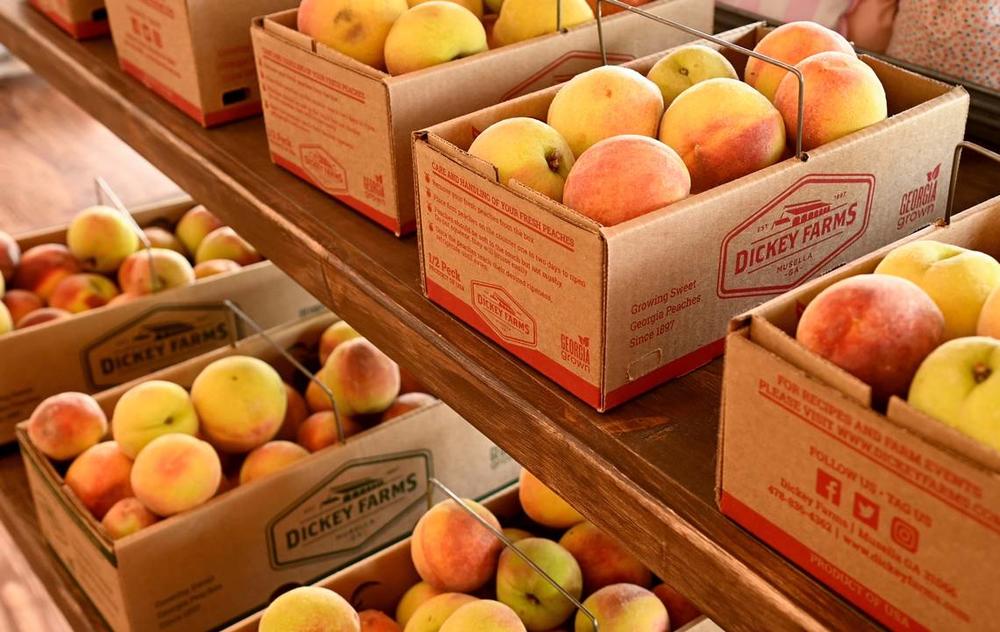
Peaches available at Dickey Farms packing house and market on a Monday morning in June 2023 in Musella. Dickey along with other Middle Georgia peach farmers sustained a substantail loss in the year's crop due to lack of chill hours and a late freeze.
Looking ahead to next spring’s harvest, Knox said, “I think the likelihood of seeing another really devastating frost next year is not that high.”
The roots of her cautious optimism on this point lie in the fact that, this year, the planet is undergoing a switch in the El Niño Southern Oscillation — a gigantic weather pattern based in a cycle between warmer and cooler temperatures in the eastern Pacific Ocean.
For the last three years, those temperatures have been colder — a formation known as La Niña — but this year saw a swing back to its counterpart, El Niño.
Globally, the effects of El Niño involve a likely increase in temperatures. But in Georgia, Knox said, during El Niño “in the winter months we tend to see cooler and wetter conditions, because the storm track comes right over Georgia, especially South Georgia.”
What does this portend for the Peach State’s peaches?
“We’ll reach our chill hour requirements more quickly. But it also means, since it’s cooler, we’ll probably have a slower or later bloom period, so they’ll be less vulnerable to frost,” Knox said.
For Dickey Farms’ seasonal workers in Guadalajara, a lot is riding on the hope of a better peach crop next year.
In March, after the frost, the Carrazco brothers had to inform dozens of their friends and neighbors back home that they wouldn’t have work in Georgia this summer. Roberto said this was “difficult for everybody, and especially for the ones that were already on the list [for a work permit]. At the end, you tell me we don’t have [anything], it’s hard for them.”
“It was pretty hard for them because they got just one choice,” Elezar said.
The only comparably lucrative work available in Guadalajara to most of these men is bricklaying, a job Elezar said pays about $60 a day — “but the other guys, the farmers, they only make, say, $30 a day,” as opposed to more than $100 picking peaches for the Dickeys.
“So, they’re going to wait until next year,” Elezar said. “We pray to God we have a good peach season next year.”
This story comes to GPB through a reporting partnership with the Ledger-Inquirer.